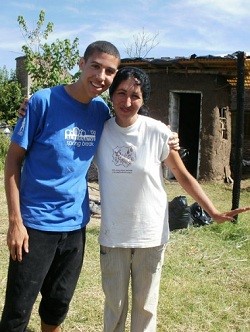The Traveler and the Peacebuilder
A Reflection on the Connection between Study Abroad and Peacebuilding
As a college student, I yearned to travel abroad to immerse myself in a culture different than the one I had known all my life in the United States. For this reason, I traveled to Argentina in my second year to study Spanish and help construct a community garden in a neighborhood with high rates of child malnutrition. This would become a place for children to learn to garden and eventually harvest the vegetables they planted. Before this could happen, however, the garden directors needed plenty of help turning the future site–which we found upon our arrival was little more than a large patch of overgrown grass in the middle of an urban area—into a kid-safe and visitor-friendly educational space.
Given the amount of work we had cut out for us, my fellow students and I were eager to make every day of volunteering full and productive. We created a timeline of projects to finish on a daily and weekly basis, and set about to accomplish as much as possible. Less than a week into the project, however, we became dismayed that the garden directors wanted us to sit down every day precisely at the stroke of 4:00 to drink maté, a tea consumed all across the nation as part of daily routines. Exasperated that our service project was falling behind schedule, we would try to squeeze out every last second of work before caving in and plopping down in the shade for tea time. This happened with each passing day, and with each passing day we would prolong working until we’d finally acquiesce and join our Argentine counterparts for maté. When our routine continued to the point that it was borderline rude—with almost half of our group outright ignoring the protestation to join our hosts for maté—one of the Argentine garden directors asked our trip leader why we seemed reluctant to put down our tools.
“We know you want us to get a lot done,” our leader sighed, “but we’re not going to finish these projects at this rate.” Realization dawned on the face of our host.
“We would rather know you well than work you well,” the garden director replied. An epiphany dawned on our group: for our community partners, progress was not about building a garden as fast as possible; it was about building human relationships with those who joined them on their mission. After that day, my group toiled eagerly to finish our assigned tasks—but equally as eagerly dropped our tools to enjoy the daily maté ritual with our Argentine counterparts.
As I reflect on this experience years later, and now on staff at the U.S. Institute of Peace, I realize that there is a link between education abroad experiences, like mine in Argentina, and the work of building peace. The connection lies in the traits and skills that are developed by education abroad experiences, which are, in fact, the same ones we draw upon to build peace. For example, my Argentine trip taught my volunteer group to be more flexible. Most study abroad trips, in fact, teach us greater flexibility: to see the world differently and live our lives in ways unfamiliar and unknown. To truly understand and appreciate a new culture, we have to relax our usual routine to adopt customs and practices of our new culture—giving up an hour of my day to drink maté, for example. Studying abroad also requires a willingness to be challenged: to be more tenacious and resilient by overcoming the challenges of living in a new place that often comes with language barriers, different cultural norms, and novel environments full of foreign people and places we’ve never encountered. Education abroad experiences present us with new ideas and beliefs, and as we encounter new worldviews, these experiences teach us to be patient—with ourselves and with others—as we convey our identity and background to others while learning to appreciate and accept theirs.
Like building a community garden from scratch, building peace is not easy work, but it is possible, and it requires an array of special qualities. Chief among these are commitment, hard work and tenacity. And like realizing that progress sometimes means building relationships over a cup of maté rather than building a garden as fast as possible, building peace requires a willingness to have our views challenged in ways we don’t always expect.
What’s more, building peace often relies upon empathy, and an ability to appreciate the diverse perspectives and realities that govern people’s lives and behavior. By definition, a conflict between two or more parties involves seemingly divergent desires, ideas and beliefs. To manage conflict effectively, we must strive to understand the differing interests and perspectives presented; only then can we hope to create peace where conflict exists. Perhaps more than anything, the hard work of building peace requires the same patience that is developed by studying abroad: patience with oneself, patience with others, and patience with the process.
It is in this process of peacebuilding that USIP is engaged around the world. While the Institute works to prevent, mitigate and resolve international conflict to build peace, students can work to cultivate within themselves the tools and skills needed to be a peacebuilder. My time in Argentina illustrated that studying abroad can be an effective avenue to learning these skills, and my time at the Institute has illustrated that, still today and for some time to come, there will be many opportunities to put these skills to work.
Written by Denson Staples, former Program Specialist for the Global Peacebuilding Center at the U.S. Institute of Peace.

